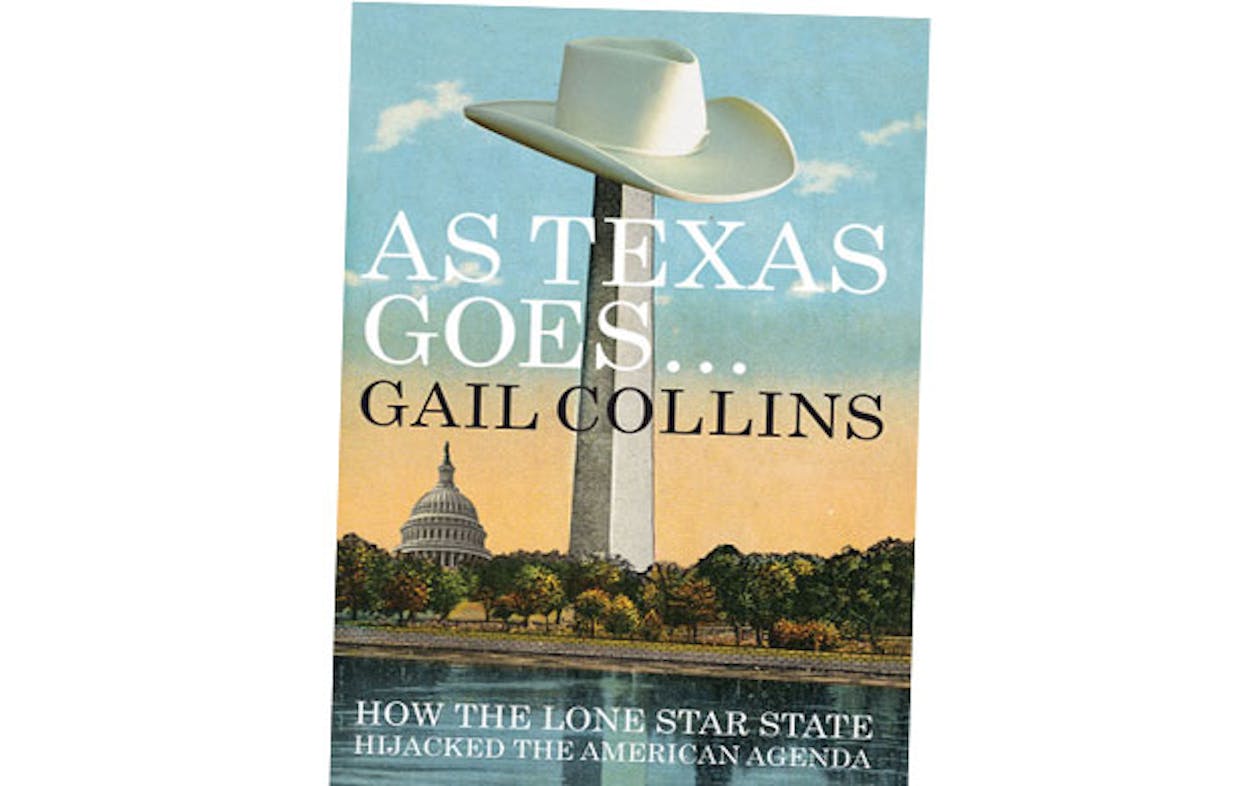New York Times columnist Gail Collins, author of the new book As Texas Goes, spoke to Salon about the state on Saturday, in an interview that was conducted by Kyrie O’Connor of the San Antonio Express-News.
“I’m certainly crazy about the people in Texas,’ Collins said. “They’re kind of amazing. But as I said in the book, Texas has both managed to lead the country in paranoia about the federal government and dictate a great chunk of this national agenda over the last 30 years, which is kind of a strange combination.”
Collins discussed the state in the context of her theory of “empty places” vs. “crowded places.”
If you live in a place that you perceive to be a crowded place you appreciate government, you see it as this thing that protects you against crime, that keeps order, that makes sure that nobody puts a massage parlor next to your house, that keeps other people’s dogs from pooping on the sidewalk.
If you live in what you perceive to be an empty place, it’s sort of like: What’s the point? I’m here, I’m taking care of myself, I’m not bothering anybody else, why are you messing with me? And the sense of what government can do and should do is vastly different.
Now the problem for empty places is that outside of the U.S. Senate, if you don’t have any people, you don’t really have much power. Nobody is going to write a book about how Wyoming is running the country. But Texas is genius in that it’s gotten huge. Most of its residents actually live in metropolitan areas, yet they really feel like they’re all living in empty places. You can live in Houston and still feel as if you’re living someplace where there’s lots of elbow room and you’re not getting in anybody else’s way. It’s very interesting.
Collins did have praise for the fact that Texas’ was not as badly affected by the housing bust due to pro-consumer policies. She also said that Friday Night Lights was her favorite television show of all time.
On Sunday, Collins’ book was reviewed by her own paper. Lloyd Grove, the longtime Washington Post columnist who also worked at the Dallas Morning News and Corpus Christi Caller-Times, tackled the book for the New York Times Sunday Book Review.
Grove opens his piece by singing the state’s praises:
Texas — that vast and various landmass of nearly 26 million souls — boasts some of the most acclaimed public and private universities, a vibrant art and architecture scene, and world-class symphony orchestras and opera companies. It is one of the nation’s leaders in medical research; rightly celebrates its reputation for manned and unmanned space exploration; rejoices in its richly diverse and tasty cultural stew; and glories in its professional football teams.
He also points out the fact that Dick Armey, Phil Gramm, and George W. Bush aren’t Texas natives:
Which is to say, more and more Texans — nearly 1.8 million from 2000 to 2009 alone, according to census figures — arguably had their values formed and their politics shaped outside the state’s borders.
That’s meant as a rebuke to Collins’ perception of Texas’ great influence, but it also suggests that people with certain politics and values come to Texas because their ideology is welcome here.
Writing in TEXAS MONTHLY, University of Texas political science professor James Henson felt that Collins settled for obvious attacks on Rick Perry, and that she “epitomizes a coastal take on Texas that frowns on the state’s political ideology even as it misses the underlying politics that actually explain things.”
In particular, Henson wrote, Collins actually lacks insight into the state’s rural/urban divide, and also the reason why moneyed white men play such a big part in electorial potlicis.
“When it comes to taking potshots at Texas, Collins is almost as quick on the draw as the governor she relies on for easy laughs,” he concluded. “Unlike Rick Perry, though, she only wounds her prey.”
You can read excerpts of Collins’ book at Slate (an introductory section), the Daily Beast (about abstinence sex education), and the New York Review of Books (about textbooks).
- More About:
- Politics & Policy
- Books
- New York City







